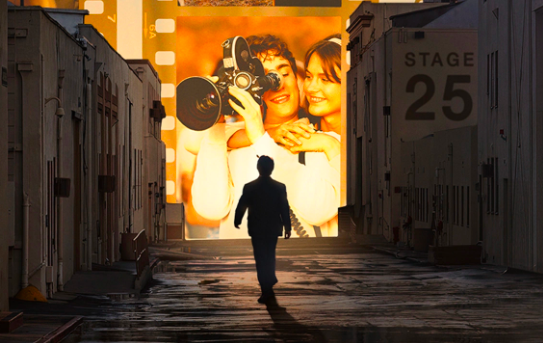Photo Credits: The Hollywood Reporter
Cinematography: 9.8/10
Costumes: 8/10
Sets: 9/10
Acting: 9.9/10
Special Effects: n/a
Character development: 8.8/10
“Movies are dreams that you never forget.” – Mitzi Fabelman
Steven Spielberg’s semi-autobiographical film, “The Fabelmans”, encapsulates the struggles of a young boy, Sammy Fabelman, played by Gabriel LaBelle, and his family as he falls in love with the art of filmmaking. Though the film scored a 93% on Rotten Tomatoes, the Box Office only received about 17.2 million dollars in comparison to its 40 million dollar budget. The Fabelmans rated PG-13 for some brief violence, strong language and drug use.
Throughout the film, viewers observe the change in family dynamics and character developments as Sammy’s parents struggle with their marriage. His mother, Mitzi, played by Michelle Williams, is fighting internal and external battles. Her progressive self tormention throughout the film leads her to become more selfish and depressed. As the film progresses, Sammy’s father urges him to use his films to uplift his mother, however in doing this, Sammy begins to carry a heavy burden on his shoulders as he learns about his family’s troubles. His father, Burt, played by Paul Dano, only sees the logical side of life and is not supportive of Sammys passion for making films as a career.
The incredible thing about “The Fabelmans” is in all of the small details. The way Sammy’s mother might be dressed in color, for example, while surrounded by a sea of monotonously dressed characters, in order to make her stand out. Or the way the camera zooms in ever so slightly so your eyes are drawn to her face as she reacts. The little things you notice if you look carefully: who one character looks at instead of the other, the way you can see in Sammy’s face as he gradually becomes a better filmmaker and at the same time loses parts of himself and his family. All of the microscopic details that build up to create an incredible film overall.
Not only do we see the detailed cinematography through the characters, but also through the eyes of Spielberg as he pays homage to other filmmakers. At the end of the movie, for example, Sammy is given advice from John Ford, a legendary Hollywood director. In the final shot, Spielberg uses that advice to produce yet another iconic Spielberg ending for the books. (Sorry, no spoilers!) Overall, the subtle and clever details through the eyes of a filmmaker were placed precisely- right where they needed to be adding up to produce a great movie.
The Fabelmans tackles complex themes of growing up as a Jewish teen in the 1960s, and how Sammy faces the rise in anti-semitism. It was interesting to see how Spielberg incorporated his own personal experiences and perspectives into the film, especially as Sammy ages and begins to experience the three greatest challenges of teen years: bullying, love and finding passions.
As Mr. Buskey, the Fieldston film teacher, said in our interview with him “The writing is the most important part to making an Oscar winning film”. The Fabelmans definitely had a bit of everything: comedy, romance and tragedy, all perfectly displayed through a very well written script. As viewers, we had countless conflicting emotions. At the start, when Sammy was a young boy and first started to make films, it actually made us smile and laugh out loud. However, towards the middle and end of the movie, we teared up and felt sympathy for Sammy as he learned more about the truths of his family. One of our most memorable, on-the-verge of-tears moments was at the end of the film, when Monica emphatically told Sammy, “Sometimes we can’t fix things, all we can do is suffer.”
The only improvement we wanted to see in this film was more of a development of the relationship between Sammy and his sisters. We see an evolving relationship with his parents as the film progresses, but the sisters seem to always just be “there”, and it seems as if they do not really have a large impact on Sammy’s life until one scene at the very end of the film.
Though the run time of “The Fabelmans” is two and a half hours, those 151 minutes flew by. The film never even had a slow, check-your-phone-while-you-watch scene. Out of the films we have seen and reviewed thus far, “The Fabelmans” is looking like a front runner for Best Picture. We also believe that it has a strong chance of winning Best Original Screenplay and Spielberg could win another Oscar for Best Direction.
Our Top Five Quotes from “The Fabelmans”:
- “Do what your heart says you have to ’cause you don’t owe anyone your life.”
- “When the horizons are at the bottom, it’s interesting. When the horizons are at the top, it’s interesting. When the horizons are in the middle, it’s boring as sh*t.”
- “She laughs as Bennys jokes but dad has always been her best audience.”
- “Guilt is a waste of an emotion.”
- “My life is going by so fast but it’s not going anywhere.”






